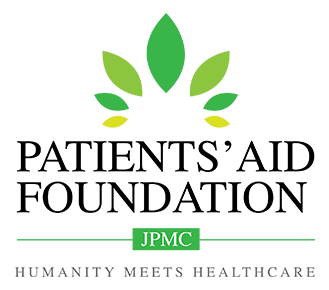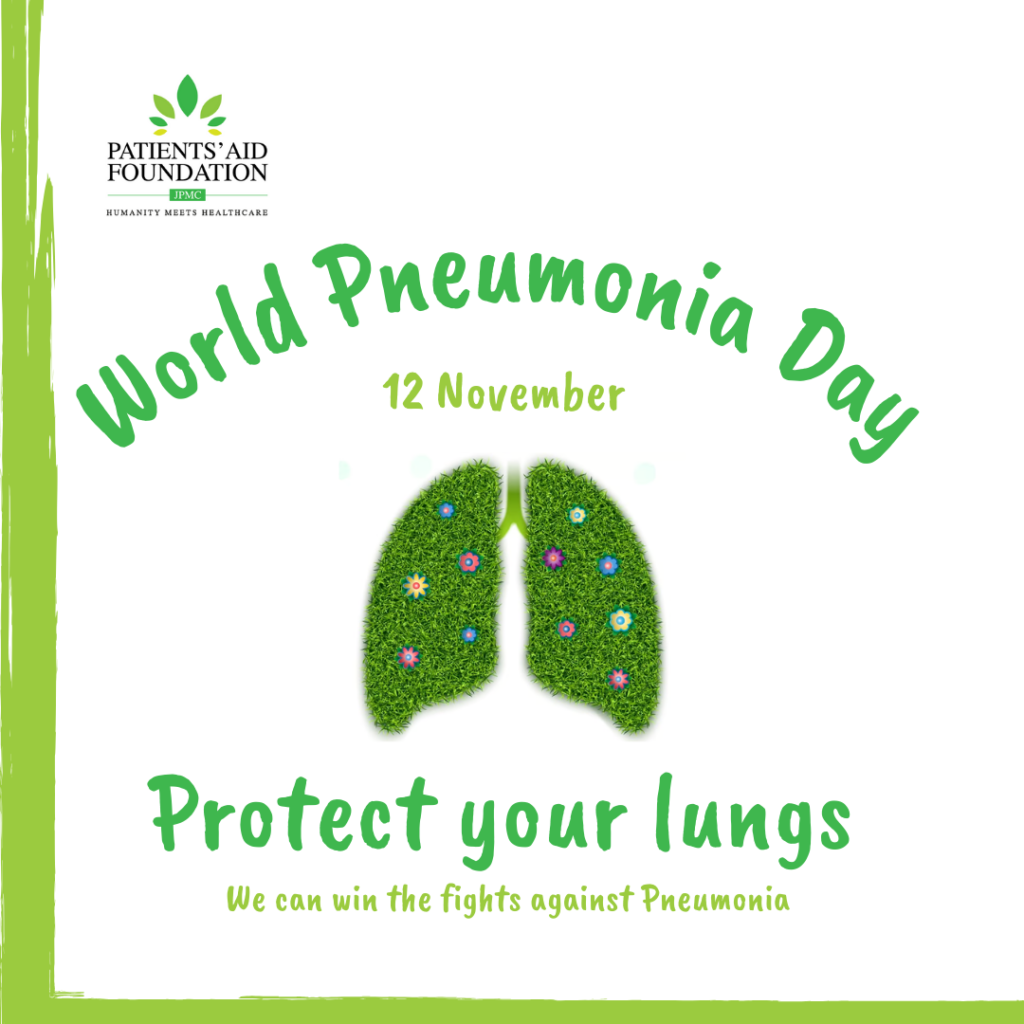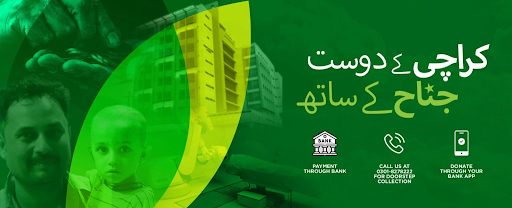World Pneumonia Day with Patients’ Aid
November 12th marks World Pneumonia Day, a day dedicated to raising awareness about the growing threat of pneumonia, a life-threatening condition if not treated promptly.
This day highlights the importance of early detection and prevention in maintaining lung health and protection. The goal is to educate people about what pneumonia is, how common it is, and which age groups are most vulnerable.
As always, Patients’ Aid is deeply committed to making a positive impact by providing healthcare services and raising awareness, helping people stay informed and take proactive steps to avoid medical emergencies.
The StopPneumonia report highlights the staggering global impact of pneumonia, with 2.2 million lives lost in 2021, including 502,000 children. This emphasises the severe health burden of pneumonia, particularly its devastating effect on young lives. In Pakistan, pneumonia cases typically surge at the end of the year, particularly during October, November, and December, making this period especially challenging for many. While vaccines are available to prevent pneumonia, it remains a significant threat, especially for children under 2 and adults over 65.
According to Tribune News, the head of the emergency department at the National Institute of Child Health (NICH) reported that the hospital handles approximately 30 pneumonia cases daily. In another Karachi hospital, 10 to 15 new cases are being reported each day.
This highlights the urgency of understanding pneumonia’s severity. Let’s learn how to protect ourselves.
What is Pneumonia? Understand the Basics
Pneumonia, as defined by the World Health Organization (WHO), is an infection that causes inflammation in the air sacs of one or both lungs, which can fill with fluid or pus.
Pneumonia is a leading cause of illness and death worldwide, particularly affecting young children, the elderly, and individuals with weakened immune systems. It disproportionately impacts vulnerable groups, including children in regions like interior Sindh, Balochistan, and Punjab, where low vaccination coverage, rising malnutrition, and reliance on polluting fuels for cooking and heating increase the risk. Exposure to air pollution, dust (often from burning fossil fuels), and smoking also significantly heightens the risk of pneumonia, especially for older adults and those with chronic lung conditions like asthma or COPD.
Nearly half of the 1.5 million pneumonia-related deaths annually among adults over 50 are linked to these environmental and lifestyle factors. Your donation can make a life-saving difference for children and the elderly in urgent need of care. Join Patient Aid today and help save lives.
Symptoms of Pneumonia:
- Cough (which may produce phlegm or mucus)
- Fever and chills
- Difficulty breathing or shortness of breath
- Chest pain (especially when breathing or coughing)
- Fatigue or weakness
- Rapid or shallow breathing
- Fast pulse
- Nausea
- Sweating
- Loss of appetite
Types of Pneumonia:
- Bacterial Pneumonia: Caused by bacteria and often requires antibiotics for treatment.
- Viral Pneumonia: Caused by viruses like the flu virus, respiratory syncytial virus (RSV), or coronaviruses. It can resolve on its own but may lead to complications.
- Fungal Pneumonia: Fungal infections, like histoplasmosis and coccidioidomycosis, typically affect individuals with weakened immune systems.
How to Stay Safe from Pneumonia – 7 Essential Tips
- Practise Deep Breathing: Regular deep breathing exercises help clear mucus, improve lung function, and reduce pneumonia risk.
- Follow Good Hygiene: Wash your hands frequently with soap to prevent the spread of germs. Keep your mouth covered when coughing or sneezing, and avoid close contact with individuals who are coughing or sneezing to protect yourself.
- Stay Active: Regular exercise strengthens your lungs and boosts immunity, lowering your risk of respiratory infections.
- Quit Smoking: Smoking damages the lungs, increasing vulnerability to pneumonia and other respiratory diseases.
- Eat a Balanced Diet: A healthy diet rich in fruits, vegetables, and lean proteins helps maintain a strong immune system.
- Improve Indoor Air Quality: Use air purifiers, ventilate your home, and avoid pollutants, especially in high-pollution areas like Lahore and Karachi.
- Seek Early Treatment: If you suspect a respiratory infection, get medical help early to prevent pneumonia and ensure faster recovery.
Taking steps to prevent the onset of these infections also plays a significant role. As we enter peak flu and respiratory infection season, it’s important to implement these practices and encourage those around you to do the same.
Patient Aid’s Role in Fighting Pneumonia
Patients’ Aid plays a crucial role in improving the lives of those suffering from illness, providing essential treatments and vaccinations to individuals who cannot afford them. The newly renovated Chest and TB wards at JPMC, supported by Patients’ Aid, are dedicated to serving the community and ensuring that no one faces healthcare disparities or discrimination.
To contribute to this noble cause and make a difference, consider donating to Patients’ Aid’s humanitarian initiatives like ‘Roz ka Sadqah’ and help support a healthier, more secure nation.
Together We Can Make a Difference!
On World Pneumonia Day, we are reminded of our obligation as Muslims to ease the suffering of others and fulfil our duty to help those in need. Let’s contribute our Sadaqah and Zakat to support the healthcare of vulnerable children and the elderly seeking medical assistance at JPMC.
Share this blog with your loved ones to raise awareness and encourage proactive steps in protecting both your health and the health of those around you.
Together, we can help reduce the impact of respiratory infections during this high-risk season. Let’s come together to extend our support to those who need it most.



